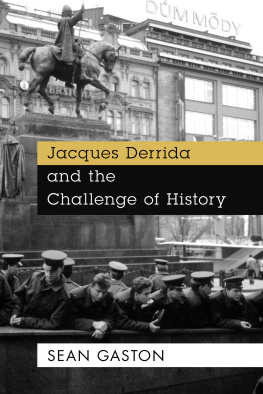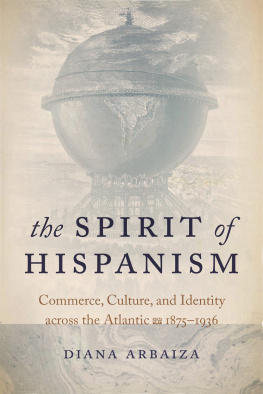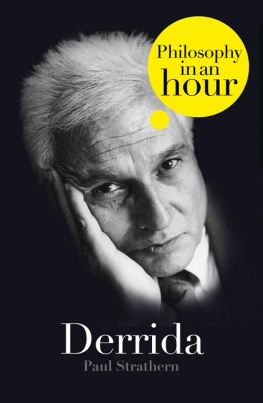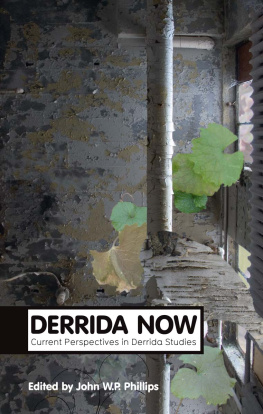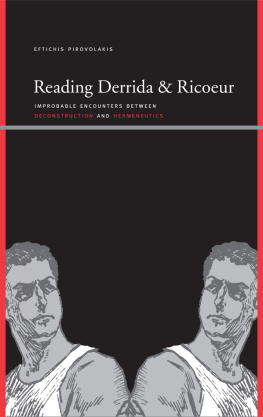Copyright 2018 Fordham University Press
All rights reserved. No part of this publication may be reproduced, stored in a retrieval system, or transmitted in any form or by any meanselectronic, mechanical, photocopy, recording, or any otherexcept for brief quotations in printed reviews, without the prior permission of the publisher.
Fordham University Press has no responsibility for the persistence or accuracy of URLs for external or third-party Internet websites referred to in this publication and does not guarantee that any content on such websites is, or will remain, accurate or appropriate.
Fordham University Press also publishes its books in a variety of electronic formats. Some content that appears in print may not be available in electronic books.
Visit us online at www.fordhampress.com.
Library of Congress Cataloging-in-Publication Data
available online at https://catalog.loc.gov.
Printed in the United States of America
20 19 18 5 4 3 2 1
First edition
Peggy Kamuf
Some of the most vibrant Hispanists working in the United States today are the authors of the essays in this volume, The Marrano Specter: Derrida and Hispanism, which emerged from the 2014 conference on the topic. The essayists agreed to reflect on the figure of the marrano as a way into questions about their field from the angles of the sort of theory Hispanism has long reproved and resisted, for the marrano also plays a significant role in the late work of Jacques Derrida, recurring there with some frequency. By pairing the fields name with Derridas, the title of the present volume opens the space of an encounter into which the essays collected here advance at their different rhythms.
The marrano, as traced by Derrida over the last dozen years of his lifes work, is taken on there at multiple levels, beginning perhaps with the level of personal identification out of which unfold various figures of universalization. The identification arises out of the childhood experience among the Jews of Algiers who called circumcision baptism and Bar Mitzvah communion, through a strange kind of assimilation to or compromise with the dominant Christian culture in which Judaism survives in remnants. In Circumfession (1991), Derrida confesses or feigns to confess: I am a sort of marrano of French Catholic culture... one of those marranos who no longer say they are Jews even in the secret of their own hearts, not so as to be authenticated as marranos on both sides of the public frontier, but because they doubt everything, never go to confession or give up enlightenment (17071).
But from there the figure of the marrano is carried by a force of universalization to which Derrida gives explicit voice. In Aporias (1992) marrano comes to name the universal condition of an impossible relation to death as to a secret. Let us figuratively call marrano anyone who remains faithful to a secret that he has not chosen, in the very place where he lives, in the home of the inhabitant or of the occupant, in the home of the first or of the second arrivant, in the very place where he sojourns without saying no but without identifying himself as belonging to (81). Elsewhere, in Abraham, the Other (2003), Derrida patiently works out this transposition of singular experience into universal description. At one point, addressing himself in the figure of the marrano, he reads off its paradoxical law: The less you show yourself as jewish, the more and better jew you will be. The more radically you break with a certain dogmatism of the place and the bond (communal, national, religious, of the state), the more you will be faithful to the hyperbolic, excessive demand, to the hubris, perhaps, of a universal and disproportionate responsibility toward the singularity of every other (13). The marrano axiomatic of more-than equals less-than or other-than is associated by Derrida with his mistrust of frontiers and oppositional distinctions, impelling him, as he writes, to elaborate a deconstruction as well as an ethics of decision or of responsibility exposed to the endurance of the undecidable (17). Marrano thus names a hyperbolic, universal responsibility, a fidelity that breaks with every community, a secret destiny that sojourns without belonging, a dissociation that inhabits the social bond.
This latter essay, Abraham, the Other, is in part a reading of a Kafka parable titled simply Abraham. There Kafka repeatedly invokes another Abraham, other Abrahams, for example, one who could not get away from the house however much he was willing to answer the call to sacrifice. Or take another Abraham, says Kafka, who likewise was ready to do the right thing, but he cannot believe that he was the Abraham addressed by the call. He fears being foolish and that the world would laugh itself to death at the sight of him. Just imagine if the worst student in the class thinks his name has been called to receive a prize meant for the best student: He came forward from his dirty desk in the last row because he had made a mistake of hearing and the whole class burst out laughing. In the midst of all these misprisions and malentendus, this other Abraham at one point fears that, if he answers the call, he will turn into someone else, and not just anyone else: He is afraid that after starting out as Abraham with his son he would change on the way into Don Quixote.
Don Quixote? Even though, in his selective reading of the parable, Derrida does not wonder about this allusion to one of the foundational works of Hispanism, others now come forward here to pursue the reflection in the shadow of Cervantes, but also of Bolao, Borges, Cortzar. It is a reflection on marranismo as it arises out of the language that first lent cover in that name to the refractory subjects who all the same respond, Yes, here I am, like the other Abraham. Marrano was meant to have the force of insult, injury, injure in French, at once insult and injury. It was meant to be a wounding word. Swine. Dirty. Outcast. But at the same time marrano deflects, absorbs, or shelters in secret the other name. It keeps the one who keeps the secret. One is entrusted for safekeeping, entrusted to a silence that keeps and guards so long as one keeps and guards it (Abraham, the Other, 6).
About a quarter century ago, in 1992, was the five-hundredth anniversary of the expulsion of the Jews from Spain. It was also, of course, the anniversary of the year Columbus gave the Old World a foothold in the New and took a first step toward the vast Spanish empire to come in the Americas. And in the same year, with the fall of Granada, Arabs were driven out of a newly unified and uniformly Catholic Spain. Annus mirabilis, annus horribilis. If we call Hispanists those who inherit and respond to this immense legacy in trust for the rest of us, then this volume is testimony to a trust well placed.
Los Angeles
January 2016
WORKS CITED
Jacques Derrida, Abraham, the Other. 2003. In Judeities: Questions for Jacques Derrida, edited by Bettina Bergo, Joseph Cohen, and Raphael Zagury-Orly, 135. New York: Fordham University Press, 2007.
. Aporias. 1992. Stanford: Stanford University Press, 1993.


